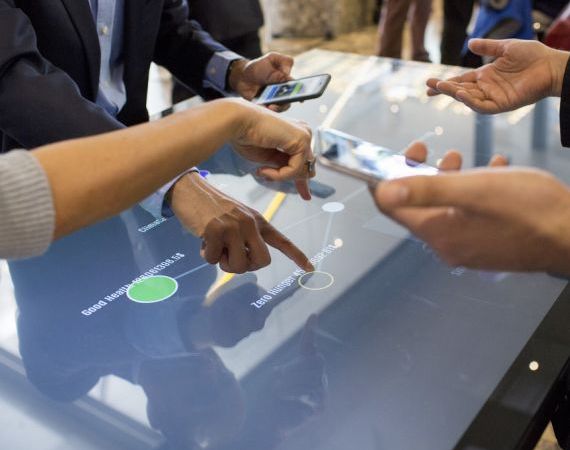Lunchtime talk write-up
Posted on Fri 31 Mar 2017
2030 Hive Mind
2030 Hive Mind is the first major project from Free Ice Cream. The company is focused on using games to help people play with complex subjects.

For the past year Free Ice Cream have been developing a game called 2030 Hive Mind for the ODI and the UN SDG Action Campaign. The game was the core of this months Global Festival of Ideas for Sustainable Development AKA the playable conference.
2030 Hive Mind is the first major project from Free Ice Cream. The company is focused on using games to help people play with complex subjects. Players are given one of seventeen sustainable development goals to achieve (we played a cut down version focusing on seven goals). Each goal has an associated number of policies to achieve this, though these policies overlap with other player’s goals and some policies will have negative impacts as well as positive. Each player has a budget to allocate to policies to achieve their goals.
Five things I Learned:
1. Policymaking is a difficult game. In this case that complexity comes in the form of a policy simulation where players get to try and collaboratively achieve the Sustainable Development Goals by selecting the policies they want to fund/ back. Rather than trying to chose one dilemma to resolve to win, interestingly Free Ice Cream’s solutions are social. One of the objectives of the game was to remove participants from their usual modes of working/areas of expertise.
2. Collaborative action is necessary to activate and/or enact policies. The players were tasked with finding other participants who share the same policies as them and convincing them to allocate funds to the policy.
3. Social interaction is key to achieving your goals. However as we found out through playing in a confined area, its difficult to move around a crowded space and you're more likely to talk to the people closest to you. Perhaps this is a reflection of what happens in the real world?
4. Strategies for being successful. What approach do you take to achieving sustainable goals? When working in dilemma spaces, perhaps the more appropriate question is what does winning look like, when both dilemmas are equally necessary?
5. The discussion after the demonstration focused on the motivation of players. Do you just focus on achieving your own objectives or take a more collaborative approach? Simon gave an example from the Global Festival of Ideas for Sustainable Development conference where players began by backing policies that had a lot of negative outcomes. This led to demonstrations from other players using placards and reduced the support for these policies.